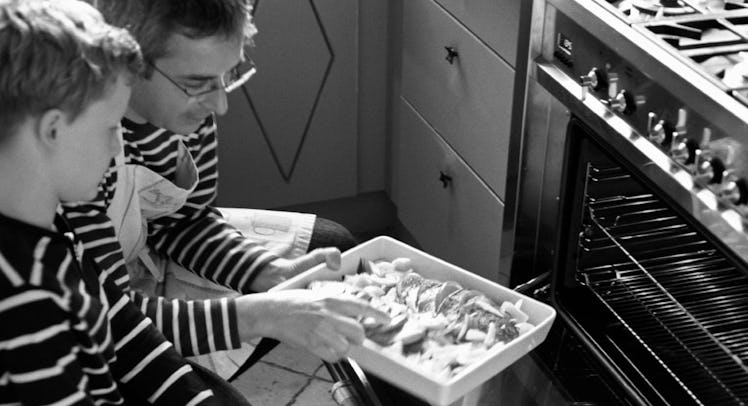Fatherly Advice: Name Your Meals
It didn't matter that his chili was flavorless, that his potatoes were drier than kindling. By naming his meals, my dad imbued them with an undeniable power.

My dad can make a lot of things: cabinets with meticulous inlays and jigsaw puzzle joints; birdie on a hazard-laden par five; people uncomfortable with his lack of social decorum. But put him in front of a stew pot or sauté pan and the man seizes up like an overworked engine. He just can’t cook. But that never mattered when I was a kid because he was damn good at branding.
I grew up in a sit-down dinner household. Every night, my parents, my brother, and I would eat a home-cooked meal together. My mom did the cooking. She got home earlier (around 3:30; my dad worked until 6) but that was simply fortuitous. She took pride in her cooking in that fierce way women from Italian families do. Cooking also allowed her to lay claim to the kitchen, which was a significant motivator because she is, shall we say, touchy about the cleanliness of things. Her rule was uncontested.
Wikimedia Commons
But mom sometimes went out of town or stayed late at work and, on those occasions, dad manned the kitchen. And, by manned the kitchen, I mean he made quick meals with whatever the hell he dug out of the fridge. He cooked bologna in a frying pan until its casing edges curled in a deeply unsettling way then slapped it between sliced bread; he squeezed an ungodly amount of mayo into canned tuna and plopped in on a plate next to crackers; he made grilled cheese that was burnt on the edges and cold in the middle.
Even when he planned a meal, the results were ferociously subpar. Take his stabs at chili, a dish that takes serious effort to screw up. My father, who would babysit the contents of a stock pot for hours on snow days, was up to the task. Since he doesn’t like peppers or really vegetables, his take consisted of canned tomatoes, ground beef, kidney beans, and hefty pours of paprika and chili powder. The result was a goopy, kidney bean Bolognese that, when ladled into bowls, shuddered like a symbiote.
Still, my brother and I both thought dad’s meals were incredible. Not because they were (they were not), but because he named them. His chili was dads signature “Big Beef Chili!!” His bologna sandwiches, “Dad’s Famous Fried Bologna Sandwiches!!” His mashed potatoes (mashed potatoes roofed with breadcrumbs, shellacked with cheese, and broiled for a few minutes until they were drier than kindling) were “Potatoes Mikey!!” Everything had a name and everything was over seasoned with exclamation marks.
When he named his meals, my dad imbued them with power. Coupled with the rare appearances of him in the kitchen, the food took on an otherworldly quality. It wasn’t dinner, it was special. Besides, my dad couldn’t be bad at anything, let alone something he slapped his name on. It had to be good.
Looking back were his culinary creations delicious? Certainly not. But 8-year-old me didn’t know the difference. All that little Optimus Prime-loving, big-headed little scamp knew was that dad was cooking and we were lucky enough to be treated to a signature meal.
It probably pissed my mom off when, some nights, seated in front of her fork-tender roast chicken, we begged for one of Dad’s Famous meals instead. But my mom mother seemed to understand this truth: to a kid, different equals great. Dad’s cooking was different. Also, she didn’t name any of her meals and that’s on her.
As I got older and my taste buds actually turned on, dad’s food titles failed to fool me. His meals became fewer and further between. On nights he was in charge, we’d all agree on a pizza order.
But not all revelations of a father’s weakness are painful. Was my dad a bad cook? Yes. Did he manage to make dinner fun anyway? Absolutely. The dad brand was strong enough to sell me on anything. The dad brand made Nike look like nothing. My dad named his dishes and, now, I do too. Mine just taste better.
This article was originally published on